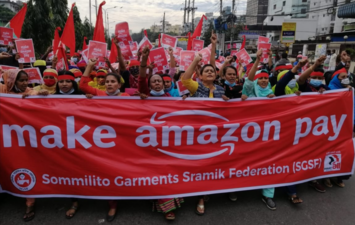
During 2020, Working-Class Perspectives touched on many COVID-related topics and showed how working-class people around the world were being disproportionately affected for a variety of reasons. Contributors showed how the pandemic brought to light the impacts of our reliance on insecure workers to provide the daily needs of societies. In my April 2020 piece, I pondered whether the growing recognition also in the mainstream media of the importance of working-class occupations would lead to any action on job security, wages, and conditions. I also wondered whether the new understanding of what makes an ‘essential’ worker would change attitudes and end the previous disparagement of so-called ‘low-skilled’ work.
Did anything change? Have working-class lives improved as a result of this new understanding? The short answer is mostly not. While journalists have continued to report on the problems faced by gig-workers and those without sick pay or health insurance, and there has been commentary on the ways that insecure work has contributed to the spread of COVID, most governments have not acknowledged that something needs to change.
True, some governments have provided temporary relief to workers furloughed or sacked due to their workplace closing during lockdowns, but none have even attempted to address the unsustainable systems that prop up economies in many countries around the world. And while unemployment and job insecurity have increased dramatically, few have even noted the massive growth in wealth for a small number of billionaires who have profited from the pandemic.
Many bosses have tried to take advantage of the pandemic in order to cut their operating costs, while governments have tried to weaken existing rights. In Australia for example, the government are proposing new laws that would further entrench insecure work, undermine many of the hard fought-for conditions, and reduce rights to unionise workplaces. Billionaire company owners such as Jeff Bezos of Amazon, have increased their wealth by obscene amounts during COVID, with Bezos raking in an extra $74 billion in 2020 to bring his fortune to a staggering $189 billion. Has this meant that their workers have shared in the profits and been treated well? Of course not. Amazon workers in the US reported COVID-related health and safety breaches in the warehouses even while millions of customers around the world were relying on their labour. These lives of these workers have not been valued by their employer.
The lives of front-line health care workers also have not been valued. They’ve been applauded and praised, but many are not getting the new vaccine because of poor planning and organisation. In the UK, health care workers have pleaded with the government to do more to prevent the increasing spread of the virus, but their calls have been largely ignored. Despite the announcement of a new six-week national lockdown there, many lives have already been lost and the rate of infection is soaring.
Read the rest of this piece at Working-Class Perspectives.
Sarah Attfield is a Scholarly Teaching Fellow in the School of Communication in the Faculty of Arts and Social Sciences at University of Technology, Sydney. She is the co-founding editor of the Journal of Working-Class Studies and a regular contributor to the Working-Class Perspectives blog.












